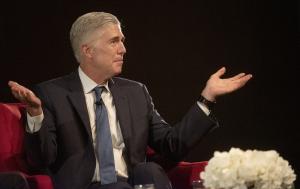
When Supreme Court Justice Neil Gorsuch, while undertaking a case concerning COVID precautions, did not wear a mask, he sent a signal indicating his hostility to and rejection of those precautions. Such vice-signaling has become quite common of late, where people act contrary to prudence and moral responsibility, unconsciously indicating their malice to society. While many of them might not know better, a Catholic Supreme Court Justice should, because Catholic teaching is clear on the moral obligations of the faith, obligations which include taking care of one’s neighbor and protecting them from undue harm. In this fashion, Gorsuch did more than leave his face uncovered, he truly let himself be unmasked, showing to the world the contempt he has for the common good, a good promoted by sound ethical reasonings as well as with Christ’s teachings.
Gorsuch is not alone. Many Catholics, many Christians, have shown their selfishness as they ignore their responsibility to their neighbor. They protest getting vaccinated, even when it can be shown to be their moral obligation; even when they are sick, coughing and sneezing, they will go to church instead of staying home, and they will do so without a mask, showing they have no concern for the people around them whom they might harm. They think they, not the vulnerable, should be held in a position of privilege and everyone should bend to their every wish. They will fight tooth and nail for the right to harm others, making others bend to their ill-will, while they will never bend themselves to the counsels of Christ, to the teachings which say they must love their neighbor, putting the good of their neighbor over their selfish desires.
“Let each of you look not only to his own interests, but also to the interests of others” (Philip. 2:4 RSV). This flows from what Christ has taught us: “A new commandment I give to you, that you love one another; even as I have loved you, that you also love one another” (Jn. 13:34 RSV). To love one another requires us to promote the common good, to make sure our neighbor’s needs are met. In doing this, we show ourselves to be true followers of Christ. “But if any one has the world’s goods and sees his brother in need, yet closes his heart against him, how does God’s love abide in him? Little children, let us not love in word or speech but in deed and in truth” (1 Jn. 3:17-18 RSV). This is Christ’s expectation for all his followers; we must be Christian in deed and not just in word. If we would ignore our moral obligations and selfishly demand our every whim be promoted at the expense of our neighbors, we have lost our way, and have, as it were, lost our saltiness. “You are the salt of the earth; but if salt has lost its taste, how shall its saltness be restored? It is no longer good for anything except to be thrown out and trodden under foot by men” (Matt. 5:13 RSV).
Opposition to proper precautions during a pandemic has led to mass deaths. Continuing such opposition not only continues to threaten society with more mass deaths, but also threatens to leave the lives of countless survivors in shambles (as many oof them have long term or permanent damage done to their bodies thanks to the virus). The spirit behind such opposition is far from Christian; to claim it is the Christian response and so demand religious exemptions against such precautions is to act, not as a Christian, but as an anti-Christian, showing one follows the spirit of the anti-Christ, not Christ. For the Christian, even if it is inconvenient, will promote the public good over their own inordinate lust for power. Christians are called to take care of their neighbor’s burdens (cf. Gal 6:2), which means, those who are poor and downtrodden, those who are vulnerable, will be taken care of as a part of following the “law of Christ” (Gal. 6:2b RSV). But, as Robert N. Wennberg said, in regards our general obligation to creation (to be good stewards of the earth), so we, as Christians, will not find such “burdens” terrible, but rather a thing which brings us joy as we will find the service of love only makes our life better as well:
We should note, finally, that burdens do not have to be burdensome. Although sacrifice and inconvenience may be required of us, surely there must be a sense of joy as we exercise faithful stewardship over a creation that contains so many wonders and beauties, a sense of privilege as we care for what God cares for. Indeed, when we come to recognize and fully appreciate the goodness of God’s creation, then the efforts we expend on its behalf and whatever sacrifices we make for it will not be offered grudgingly but willingly and gladly. [1]
It is selfishness which looks at such moral obligation of the law as something terrible, as an affront against us because it takes us away from our own inordinate desires. We can see great pride and malice coming from those who stand against the needs of their neighbors, from those who try to find every excuse to ignore just precautions needed to keep society safe. And, as St. Isidore understood, such pride always demonstrates itself in the way such people act, whereupon they will act one way when everything is going their way, but will act differently, and show the blasphemous nature which lay behind their activity, when things go contrary to their will:
The proud are always taking up cause against the good ones; when prosperity shines on them, boastfully they glory in their own merits, and then they draw away from the afflictions of the good and just; but when adversities come upon them, they are turned quickly to blasphemy by the weakness of their spirit.[2]
Sadly, so many Christians show how blasphemous they are, how far they are from following the teachings of Christ, by the way they act when they are told to do just a few little things to help take care of their neighbor. They are unwilling to wear masks. They are unwilling to take a vaccine which can and will help end the dangers of the current pandemic. They fight tooth and nail against such needs, signaling their malice to society by the way they make sure people know they do not mask up and mock those who do. They have lost their saltiness, while many in the world, many who do not hold to the Christian faith, prove themselves to be better followers of Christ’s teachings by the care and concern they show to others. Christ warned his followers that they risk losing everything if they ignore the law of love, while those who might not know they are following after him will be received by him because they lived out their lives with such great love for their neighbor (ct. Matt. 25:31-46). Christians should heed the words of Florensky, who said, in order to promote the common good, our behavior should be exemplary, so that if everyone acts for the sake of the common good, then things, even if they will not be perfect, will at least be bearable:
Act so that your behavior can be an example for everyone. If you consider what would happen if everyone did like you, then you would realize that society would start to fall apart and that life in general would become unbearable for everyone, including you. So try to behave so that your behavior, if repeated by everyone, would make life, if not perfect, at least bearable. [3]
The problem which lies before us is not just COVID19 denial and the obstruction many Christians have had in regards the public good, it is the spirit behind such denial. It is the pride and malice which makes for such reactions. Such a spirit is far from the spirit of Christ, and should have no place in the life of a Christian. But through the years, it has been coddled and ignored. Gorsuch, with all his education and time within the church, should have known better, but because of the way the church has been of late, perhaps he does not. Certainly others are ignorant because the church has not done right to the world by focusing on the basic principles taught by Christ. But it is also worse than that. Many leaders of the church show a similar spirit, a similar malice, the malice, it can be said, will be had by the anti-Christ. So long as this is the case, is there any question why so many people are turning away from the Christian faith?
[1] Robert N. Wennberg, God, Humans, and Animals (Grand Rapids, MI: William B. Eerdmans Publishing Company, 2003), 56.
[2] St. Isidore of Seville, Sententiae. Trans. Thomas L. Knoebel (New York: Newman Press, 2018),210.
[3] Pavel Florensky, Letters from the Gulag. Trans. Adela Lawless (No City: Independently Published, 2020), 304 [To Mik, Jan. 3-4, 1937].
Stay in touch! Like A Little Bit of Nothing on Facebook.
If you liked what you read, please consider sharing it with your friends and family!













